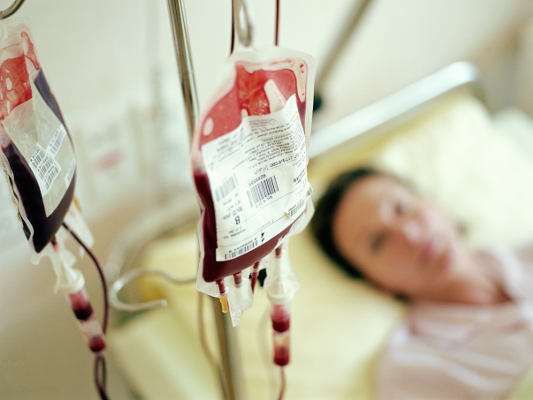According the Australian Red Cross Blood Service, 1 in 3 Australians need a blood transfusion and rely on over half-a- million blood donors to keep their supplies up.
Unfortunately, that doesn’t always equate to enough supplies.
In America for example, 30 people require blood transfusions every minute. That’s 1,800 every hour and 43,200 every day.
Fortuantely though, a team of researchers from the University of Bristol and NHS Blood and Transplant have made a medical breakthrough in that they have found a way to create artificial blood for those who need life saving blood transfusions.
That means they can mass-produce red blood cells and offer an unlimited supply of the bodily necessity to blood banks and hospitals.
And although they aren’t quite at the stage where they can actually produce large quantities, they are able to achieve it biologically.
This new method and technique has seen the team of scientists create an immortalized erythroid cell line, a world’s first, that can produce large amounts of red blood cells, with the scientists reportedly having already made “litres of blood” and means they can trap stem cells in an earlier stage of growth and induce it to create the required red blood cells.
Professor Dave Anstee, one of the scientists involved, commented on the breakthrough, “Scientists have been working for years on how to manufacture red blood cells to offer an alternative to donated blood to treat patients. The first therapeutic use of a cultured red cell product is likely to be for patients with rare blood groups because suitable conventional red blood cell donations can be difficult to source”.
This is also not the first time artificial blood has been produced as, in the past, it has been done using stem cells with red blood cells being directly introduced to them.
This, however, was found ineffective as they could only produce 50,000 cells at a time when trillions are apparently needed for blood transfusions.
This method of creating blood is in it’s very early stages and, as such, is not cheap and costs more than a simple blood donation at your local blood bank.
In the meantime, it seems, this method will be used for people who have rare blood types that blood banks do not have large supplies of on hand. The NHS have also said they have no plans to stop receiving normal blood donations.

![5 Reasons You Should Travel Alone Airplane [image source: chau nguyen/ http://thedevilhatessweatpants.blogspot.com.au ], crowd ink, crowdink, crowdink.com, crowdink.com.au](https://crowdink.com/wp-content/uploads/2016/08/Chau-airplane-218x150.jpg)




























![5 Reasons You Should Travel Alone Airplane [image source: chau nguyen/ http://thedevilhatessweatpants.blogspot.com.au ], crowd ink, crowdink, crowdink.com, crowdink.com.au](https://crowdink.com/wp-content/uploads/2016/08/Chau-airplane-100x70.jpg)


